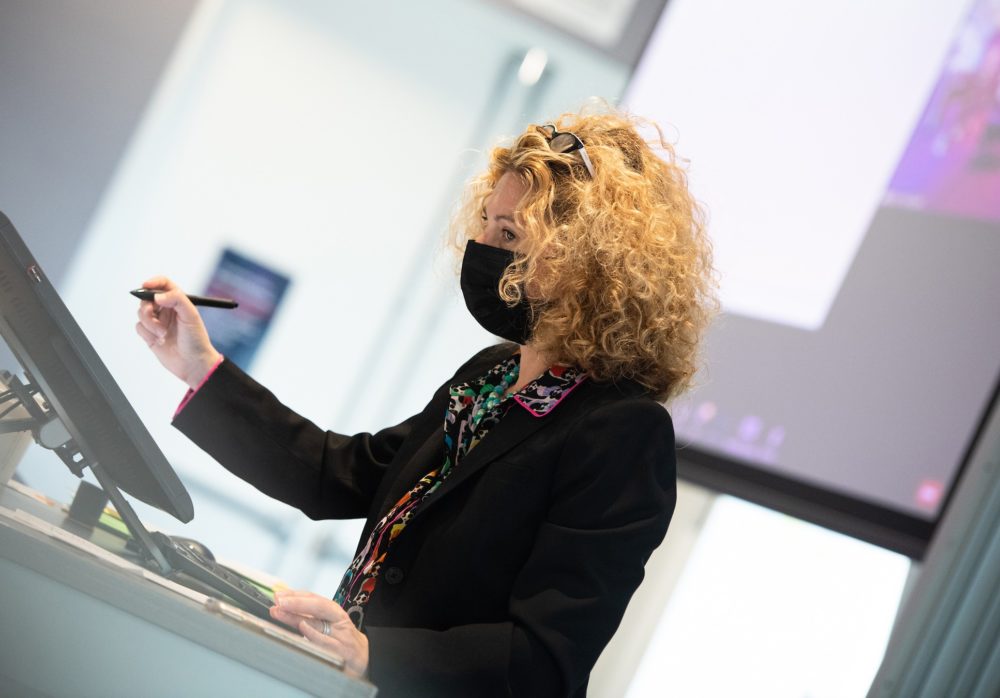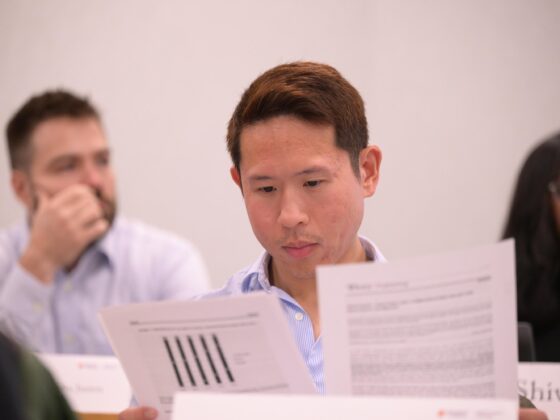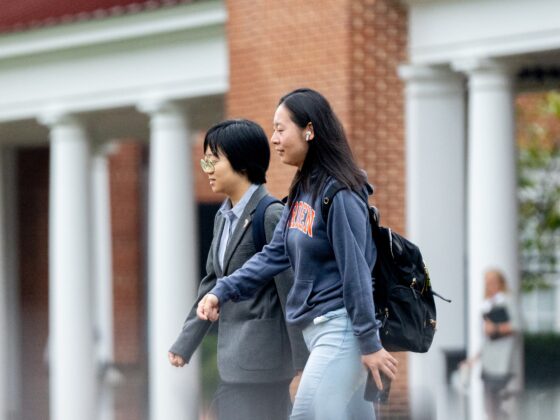Today on the blog, we’re excited to share a Q&A with Senior Associate Dean Yael Grushka-Cockayne all about UVA Darden’s Executive MBA program. Of course, Grushka-Cockayne is no stranger to the Discover Darden blog — check out her profile from her earlier Ask Me Anything session as well as our Fall 2020 semester retrospective that featured insights from both Grushka-Cockayne and Senior Associate Dean Tom Steenburgh.
Interested in joining UVA Darden’s Executive MBA Class of 2023? Starting with our 10 March deadline, we will be transitioning to evaluating applications on rolling basis. What does this mean for applicants? Once you finalize your materials, go ahead and submit your application, and we will begin moving it through our review process. Work on your application.
Q: How has the EMBA evolved over the years?
A: The story of the Darden Executive MBA program is one of continued innovation, and this has been true since the program’s launch in 2006.
In the past five years, we have integrated our two executive formats — Executive MBA (EMBA) and Global Executive MBA (GEMBA) — launched a new location in the Washington, D.C., area, established that location as the base learning location for all of our executive format students, and expanded our global offerings to now 12 global residency locations spanning all major continents.
During this time, we have also seen a significant increase in applicant interest and program enrollment. It’s clear our Executive MBA program resonates with working professionals seeking a top MBA brand and a design that blends convenience, a supportive culture and the highest quality educational experience.
Q: How many years in their careers do most students have?
A: Prospective students often focus on the word “Executive” in the name of the program, but, for us, “Executive” simply refers to a schedule, and is another format of one degree: a Darden MBA.
With a preferred minimum of five years of work experience, there is tremendous diversity of experience in our classroom. In our most recent Executive MBA class, students’ years of work experience ranged from four to more than 29 years, with an average of 11 years.
One of the things students enjoy about our program is they get this incredible community of colleagues, all on strong professional trajectories, in diverse industries, who are at various stages of their career journeys. As you might imagine, this makes for very interesting class discussions.
Q: Describe how the program is structured in terms of: weekend classes/video-virtual/online/projects/cohorts.
A: Our program is hybrid in design, with two-thirds of the program delivered in-person and one-third online. It is cohort-based and students are in lockstep. All students start the program together in August and graduate together 21 months later in May.
There is a strong emphasis on leadership development that runs throughout the curriculum, and students start and end with week-long leadership residencies on the main Grounds of the Darden School in Charlottesville.
In between, there are twenty weekend residencies which occur, on average, one weekend a month. These three-day residencies take place at UVA Darden DC Metro, Darden’s state of the art Grounds in Rosslyn, and run Friday through Sunday, with Friday classes starting at Noon and Sunday classes concluding around 3:00 p.m. As you might imagine, these are very full days, and students and staff usually plan co-curricular and social programming during these weekends, as well. One example of this programming is our regular speaker series, Friday Night Live, in which C-Suite leaders share lessons learned and insights from their career journeys in an informal, conversational setting.
In addition, both of our executive formats — EMBA and GEMBA — are global in scope, with all students participating in at least one, week-long global residency during their course of study. In fact, the only difference between our EMBA and GEMBA formats is the amount of required global experience. EMBA format students participate in one required global residency, with the option of adding additional global residencies for an additional fee. GEMBA format students participate in four global residencies. Our program’s design is unique in that our executive formats are integrated, meaning that EMBA and GEMBA students are part of the same class and learn together over the course of the program’s 21 months.
Our current slate of global residencies spans all major continents and includes an incredibly diverse set of destinations. Current locations include Brazil, Argentina, China, Germany, Japan, Ghana, Israel, India, Estonia, Australia, Cuba and Vietnam. These trips are offered across four distinct travel periods, and students indicate their travel preferences prior to matriculation.
Lastly, since its inception, our program has included a virtual component, with students participating in online class most Tuesday and Thursday evenings from 7:00 to 8:30 p.m ET. These are typically live, synchronous sessions, and I find they are often one of the most underrated parts of the program. These sessions further reinforce the spirit of community that pervades our program as students see and engage with each other, as well as faculty, regularly — as opposed to just a few times a month.
Q: What changes did you make because of the pandemic?
A: While we have adapted our program in response to the pandemic, we have not made any long-term changes to the program as a result of COVID-19. As with everything we do here at Darden, we have involved our many stakeholders — students, faculty and staff — as we have navigated the pandemic. While we have had to do much more virtual class delivery over the past year, we have continued to seek ways to offer in-person learning and foster community during this challenging time.
This summer, we added technology to our classrooms that allows for in-person and virtual participants in the same class session. Our faculty take great pride in their craft as teachers, and they have enjoyed learning how best to lead discussions in this hybrid setting.
Our students are busy working professionals, and many have young families. Their lives have become more complex over the past year, and, as a program, we have worked hard to make the students’ school lives easier — from small schedule adjustments to complimentary meals and snacks during the weekend residencies. We have found that each of our classes has its own preferences, and our students have been incredible partners in this work.
I have been so impressed by our community’s resilience, and I am confident that we will come out of this experience an even stronger program.
Q: Describe how students work with businesses on their projects and in any other ways.
A: Darden is a school that has always been connected to the world of practical affairs. In some ways, our Executive MBA program — where students can take what they learn on Sunday and apply it at work on Monday — is the best example of this real-world orientation. One of the benefits of the Darden’s case method approach is that students learn through application. As a result, it’s clear to them how they can use the knowledge and perspective they are acquiring to solve actual business challenges.
The Executive MBA program also provides our students with a laboratory where they can bring problems and challenges from work and workshop them with classmates and faculty. It’s not uncommon for our students to write a business case informed by their own experience as part of an independent study elective. Students have been the source of leads for Global Consulting Projects, have started community consultancies and have launched ventures with classmates; there are so many exciting initiatives that blurred the line between classroom and the real world.
Q: Talk about the benefit students gain learning from other experienced career professionals.
A: In our Executive MBA program, students learn through the case method, and this kind of high engagement classroom creates incredible opportunities for students to learn from one another.
As you might imagine, when students are discussing a case, their whole background — their work experience, their lived experience, their passions, their interests — comes into the classroom conversation. From a faculty perspective, one of the best things about working with our Executive MBA students is that they often have past experiences that directly intersect with the problem or decision at the heart of the case.
In this kind of supportive setting, not only do students get to take risks, practice senior level leadership and sharpen important executive skills, they also get to benefit from the perspectives of their peers. This is the true power of the Darden classroom, and why our Admissions team is so focused on creating an intentionally diverse, curated cohort from a wide-range of backgrounds and industries. We are looking for people who not only want to contribute to the conversation, but who are also eager to learn from others. Both orientations are essential for the Darden classroom.
One more subtle point regarding the power of this pedagogy relates to the motivations of the people in the classroom. Our students have all chosen to be active participants in their MBA experience. This is not a transactional decision for them. As a result, they are also very engaged outside the classroom, and we have a number of student leadership roles as well as a growing number of Executive MBA student organizations—currently 10 and counting).
Q: What are students’ typical goals when enrolling in the program? What are some next jobs in their careers?
A: Our Executive MBA students have a wide range of career interests. This is one of the reasons why our Career team works with each student individually to create a personalized career plan, and this support begins prior to matriculation.
However, at a high-level, it’s fair to say that all of our students are using their time in the program to explore different pathways and possibilities. Our program is intended to be transformational, and it is a time of self-discovery for our students. As a result, when it comes to their goals, we encourage them to be both focused and open. You never know what may spark your next step — a case, a class, a conversation with a classmate, an informational networking call. The possibilities are truly endless.
We have always had a strong contingent of career climbers — students seeking to move up within their existing company — in our program. However, over the past few years, we have seen an increasing number of students seeking to leverage their Executive MBA experience to switch function and/or industry, and we expect this trend to continue.
We also have seen a growing interest in entrepreneurship among our students. Executive MBA students have access to incredible venture-related resources through Darden’s Batten Institute, and we find that this support combined with the network, knowledge and confidence that comes with a Darden MBA is the final push students need to take the leap and launch their own business.
As our program has grown over the past few years, we have worked to expand our career development offerings, and we have a robust set of offerings designed to meet students where they are. We even have a required course — the Professional Advancement Course — that all students take in the first quarter of the program. The class encourages students to ask big questions about their path and purpose and helps them set a roadmap for the years to come. Of course, career support for Darden graduates does not end at graduation. The school also offers complimentary alumni career services for all alumni for life.
PS – Prefer your content in media form? Be sure to listen to Yael’s The ExecMBA podcast interview from last spring, her Leadership Unscripted conversation with Rana el Kaliouby about AI, Diversity and Humanizing Technology, as well as her more recent guest turn on the Darden student produced Third Coffee podcast.
Be sure to consult the Latest News regularly for the most updated news releases and media hits. Check out faculty thought leadership published on Ideas to Action. And stay connected with us via social media: Facebook, Instagram, LinkedIn, Twitter, WeChat





